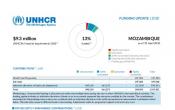Mozambique
Operation: Mozambique
Location
{"longitude":34,"latitude":-18,"zoom_level":5,"iso_codes":"'MOZ'"}
By clicking on the icons on the map, additional information is displayed.
The boundaries and names shown and the designations used on this map do not imply official endorsement or acceptance by the United Nations.
Key Figures
| 2020 planning figures | |
| 100% | of people of concern opting for local integration have been locally integrated |
| 100% | of primary school-aged children will be enrolled in primary education |
| 85% | of people of concern registered on an individual basis |
| 80% | of people of concern graduated from livelihood trainings employed after three months |
| 2018 year-end results | |
| 100% | of refugees had access to primary health care |
| 2,500 | registered refugee children enrolled in primary education |
| 390 | advocacy interventions on SGBV prevention and response were undertaken |
| 260 | refugees and asylum-seekers received legal assistance |
| 120 | refugees and host community members received life-skills training for livelihood purposes |
| 110 | refugees were resettled to third countries |
People of Concern
371%
Increase in
2019
2019
| 2019 | 206,207 |
| 2018 | 43,736 |
| 2017 | 45,035 |

[["Refugees",4708],["Asylum-seekers",20983],["IDPs",180516]]
Loading ...
Mozambique
< Back
2019
{"categories":[2015,2016,2017,2018,2019,2020],"budget":[5.14927993,5.50288191,5.52294825,5.94621359,9.05979366,9.6878531],"expenditure":[2.89281237,2.77095579,3.25396842,3.9230942,6.04628116,null]}
{"categories":[2015,2016,2017,2018,2019,2020],"p1":[4.76918068,5.11505699,5.39732245,5.62665857,5.83019729,7.39205002],"p2":[0.38009925,0.38782492,0.1256258,0.31955502,0.11797337,0.22613208],"p3":[null,null,null,null,null,null],"p4":[null,null,null,null,3.111623,2.069671]}
{"categories":[2015,2016,2017,2018,2019,2020],"p1":[2.71037374,2.60526196,3.23707626,3.8018527,3.86719339,null],"p2":[0.18243863,0.16569383,0.01689216,0.1212415,0.09382781,null],"p3":[null,null,null,null,null,null],"p4":[null,null,null,null,2.08525996,null]}
Loading ...
CHOOSE A YEAR
- 2015
- 2016
- 2017
- 2018
- 2019
- 2020
Operational Environment
After three years of internal political strife in Mozambique, the peace process concluded in 2018 has resulted in a revision of the Constitution and the integration of the former combatants of the opposition movement into the armed forces and police. In this stabilizing political context, the majority of the Mozambican asylum-seekers in Zimbabwe are expected to return spontaneously in 2019. In addition, due to continued political instability in both Burundi and the Democratic Republic of Congo, the number of new arrivals is expected to remain at some 160 people per month. The estimated number of people of concern in Mozambique in 2019 stands at some 37,800.The quality of asylum in Mozambique remains relatively good, despite reservations to the 1951 Refugee Convention and Protocol. The Government adopted the new United Nations Conventional Travel Documents (UNCTDs), issues new refugee cards, registers births of refugee and asylum-seeker children, as well as allows people of concern access to primary and secondary education, public health care, and engagement in economic activities and gainful employment in the formal and informal sectors. Although Mozambique continues to welcome new asylum-seekers, no refugee status determination decisions have been signed by the Minister of Interior since 2011.
In order to pursue the long-term vision of enhancing the local integration of refugees in Mozambique, in 2019 UNHCR will continue the implementation of a multi-year livelihoods project that aims to build self-sufficiency of people of concern.
To advance the priorities set for 2019, continued coordination with the Government, NGOs and UN stakeholders will be key. UNHCR contributes to the United Nations Development Assistance Framework and participates regularly in coordination bodies, such as the cluster system. In addition, UNHCR is establishing links with the private sector through a livelihoods project. UNHCR maintains strong connections with faith-based organizations, particularly those active in the Maratane refugee camp, to best serve the refugee community.
Key Priorities
In 2019 UNHCR will focus on:- Promoting the local integration of refugees through access to livelihoods activities;
- Improving registration through the implementation of a biometric identification system and managing individual cases with a more modern and efficient database;
- Promoting access to citizenship for refugee and asylum-seeker children born in the country and assisting recognized refugees in the naturalization process; and
- Improving education possibilities for both urban as well as camp-based refugee children.





















